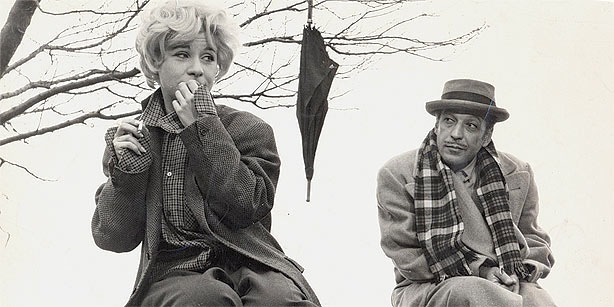Turkish Prime Minister Recep Tayyip Erdogan pretty ruthlessly cleared Istanbul’s Taksim Square of protestors yesterday. In the New Republic, Jenna Krajeski suggests that “What looks like an emotional reaction to chaos and opposition could be—perhaps more disturbingly—savvy political math: A divided Turkey wins elections for the AKP.” Kaya Genç‘s riff on the movement that quickly became known as Occupy Gezi as a cinematic event for Sight & Sound was written before yesterday’s crackdown, which would explain its tone, more celebratory than urgent.
For example: “The Turkish Film Critics Association was quick to draw a parallel between the events and their beloved art form. The headline of their press release was ecstatic: ‘We love this film that we’re in!'” Genç also takes us on a breezy walk through depictions of Istanbul in Turkish cinemas as well as Hollywood blockbusters before returning to a moment that captures the pre-crackdown spirit of at least one group of participants: “Walking around the park last Thursday I came across Senem Aytac, the deputy editor of Altyazi film magazine. I suggested to her that they could edit their new issue at the park. She said it was an interesting idea. She was on her way to a tent pitched by fellow critics. That evening the Turkish Film Critics Association screened a Turkish classic which represents the city in all its glory and sadness. Atif Yilmaz’s film is called Oh Beautiful Istanbul.”
In other news. Salon‘s Andrew O’Hehir reports on an “episode [that] reminds me of the way the old Marxist-Leninist left used to expend its most overheated invective in internal disputes, rather than at its actual enemies.” Writing for TruthDig, Chris Hedges joins the merry band of lefter-than-thou pundits piling on Alex Gibney because, as O’Hehir puts it, “Instead of a stirring yarn about a generation-defining moral and political conflict, with Julian Assange in the starring role of David/Jesus/Joan of Arc, [We Steal Secrets: The Story of Wikileaks] is a messy tale about imperfect people.”
Cineuropa passes along a dispatch from Jean-Pierre and Luc Dardenne: “A delegation of European filmmakers, composed of Lucas Belvaux, Costa Gavras, Daniele Luchetti, Dariusz Jablonski, Radu Mihaileanu, Cristian Mungiu and accompanied by the actress Bérénice Béjo, met with European Commission President José-Manuel Barroso on Tuesday, June 11th in Strasbourg. They told him again the necessity to exclude audiovisual and cinematographic services from the negotiation mandate for the trade agreement between the United States and Europe.”
Roger Corman will launch Corman’s Drive-In, a YouTube subscription channel tomorrow, reports Susan King in the Los Angeles Times.
Six directors have been selected for the Berlinale Residency 2013: Emir Baigazin (Kazakhstan), Bence Fliegauf (Hungary), Alistair Griffin (USA), Sebastián Lelio (Chile), Elina Psykou (Greece), and José Luis Valle (Mexico).
Reading. In “The New Materialism,” an essay for Printed Project, Ed Halter considers recent experimental cinema’s penchant for scratching, bleaching, painting, emulsion-lifting, optical printing, hand-processing, and various other means of altering the surface of celluloid.” In a tweet earlier today, he refers to the piece as a “prequel” to another, “The Matter of Electronics,” written in 2010, in which he addressed “a notion that I have felt was intuitively true but have never explored in depth: that the 8-bit or ‘low-res’ aesthetic of much contemporary electronic art can be thought of as a form of digital materialism.”
New York. Previewing the Human Rights Watch Film Festival, opening tomorrow and running through June 23, Michelle Orange asks in the Voice, “What impact can documentaries like the ones showing at this festival hope to have?”
London. The second part of the BFI’s retrospective Tony Garnett: Seeing Red is on throughout June, and Prostitute, a documentary the renowned producer directed in 1980, screens on Friday. For the BFI, he looks back on its making: “Above all, I wanted to show the world as I found it, from the point of view of the prostitutes. I wanted to give them a voice, without pat sociology or superior moralizing.”
Obit. “As an actor, Harry Lewis took second billing to the likes of Humphrey Bogart and Edward G. Robinson, most notably in the 1948 film noir Key Largo,” writes Rene Lynch in the Los Angeles Times. “But he found his own starring role as a Los Angeles restaurateur who helped usher in the concept of the ‘gourmet burger’ when he launched the ground-breaking Hamburger Hamlet restaurant chain, among others…. Among the restaurant’s regulars: Ronald Reagan, Elizabeth Taylor, Sammy Davis Jr. and Tony Curtis—all Lewis’s buddies from the film business.” Lewis died on Sunday, aged 93.
For news and tips throughout the day every day, follow @KeyframeDaily on Twitter and/or the RSS feed. Get Keyframe Daily in your inbox by signing in at fandor.com/daily.





